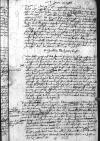List #4037
Ioannes DANTISCUS do Georg SCHEWECKEHeilsberg (Lidzbark), 1545-03-04
Rękopiśmienne podstawy źródłowe:
| ||||
Tekst + aparat krytyczny + komentarz Zwykły tekst Tekst + komentarz Tekst + aparat krytyczny
Hern
Unsernn etc.
Das sich Ewer Erbarkeit entschuldiget, / worummb die ein zceit lang nicht geschribnn, / ist unnotig, / weil uns derselbten anligen uffentlicher ist, dan es uns liebet, / alse nemlich der gewonten, alten swacheit halbenn, dar aus Ewer Erbarkeit erlediget zu sein / uns nichts were angenemers etc. Es hot sich fast wol getroffen, / den hildenheimschnn handel hie mit dem edlen, / wolgebornn hern
Datum aus unserm schlosse
